
Kathiawar is a peninsula, near the far north of India's west coast, of about 61,000 km2 (23,500 sq mi) bordering the Arabian Sea. It is bounded by the Gulf of Kutch in the northwest and by the Gulf of Khambhat in the east. In the northeast, it is connected to the rest of Gujarat and borders on the low, fertile hinterland of Ahmedabad. It is crossed by two belts of hill country and is drained radially by nine rivers which have little natural flow aside from in monsoon months, thus dams have been built on some of these. Kathiawar ports have been flourishing centres of trade and commerce since at least the 16th century.

Rajkot district is one of the 33 districts of the Indian state of Gujarat. Located in Saurashtra peninsula, Rajkot city is the administrative headquarters of the district. It is the third-most advanced district in Gujarat and the fourth most populus.
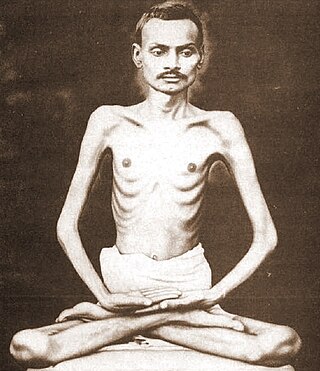
Shrimad Rajchandra, also known as Param Krupalu Dev, was a Jain poet, mystic, philosopher, scholar, and reformer from India. Born in Vavaniya, a village near Morbi, he claimed to have attained recollection of his past lives at the age of seven. He performed Avadhāna, a memory retention and recollection test that gained him popularity, but he later discouraged it in favour of his spiritual pursuits. He wrote much philosophical poetry including Atma Siddhi Shastra. He also wrote many letters and commentaries and translated some religious texts. He is known for his teachings on Jainism and his spiritual guidance to Mahatma Gandhi.

The credit for introducing Jainism to the West goes to a German scholar, Hermann Jacobi, who translated some Jain literature and published it in the series 'Sacred Books of East' in 1884. In Europe, the largest Jain populations are in Britain, with a population of about 25,000.
Parthiv Gohil is a playback singer for Indian films including Devdas, Saawariya, Saheb Biwi Aur Gangster, and Kisaan. He is known in Gujarati Cinema for hit songs Aasmani, Thai Jashe, and Soni Gujarati Ni. He co-produced 2020 Romantic Gujarati movie Golkeri. He produced Kutch Express (film), which got released on January 6, 2023.

Rakesh Jhaveri, also known as Pujya Gurudevshri Rakeshji, is a spiritual leader, mystic, scholar of Jainism, author and orator from India. Spiritually inclined from a young age, he is a follower of Shrimad Rajchandra, a Jain spiritual teacher. He completed doctoral studies on Shrimad's work Atmasiddhi. He founded Shrimad Rajchandra Mission, Dharampur which supports spiritual and social activities.

Anandghan was a 17th-century Śvetāmbara Jain monk, mystical poet and hymnist. Though very little is known about his life, his collection of hymns about philosophy, devotion and spirituality in vernacular languages are popular and still sung in Jain temples.
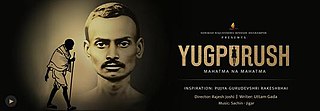
Yugpurush: Mahatma Na Mahatma is a 2016 Gujarati play based on the relationship between Jain philosopher Shrimad Rajchandra and Indian independence leader Mahatma Gandhi. The play depicts the spiritual journey of Gandhi. It is written by Uttam Gada and directed by Rajesh Joshi. The original song for the play is composed by Sachin–Jigar. It is produced by Shrimad Rajchandra Mission, Dharampur and inspired by its founder Pujya Gurudevshri Rakeshbhai. The play is adapted into seven total languages including English, Bengali, Hindi, Marathi, Tamil and Kannada. It won the Best Drama award at the 16th Annual Transmedia Gujarati Screen and Stage Awards 2016. The play has completed 1004 shows as of November 2017.

Manoj Sakarchand Shah is an Indian theatre director, actor and producer known for his works in the Gujarati theatre. He has directed over 90 plays, such as one-man plays and biographical plays, in different genres. He is known primarily for his quirky biographical plays which include: Hu Chandrakant Bakshi based on the writer of the same name, Mohan No Masalo based on Mahatma Gandhi, Apurva Avsar based on Jain mystic Shrimad Rajchandra, Mareez based on poet Mareez, Jal Jal Mare Patang based on writer-philosopher Manilal Dwivedi, Karl Marx in Kalbadevi based on German philosopher Karl Marx, and Dr. Anandibai Joshi: Like, Comment, Share based on Anandi Gopal Joshi, India's first female doctor. He produces plays under his theatre company Ideas Unlimited.

Golkeri is a Gujarati comedy drama film directed by Viral Shah and produced by Manasi Parekh and Parthiv Gohil under banner of Soul Sutra Studio. It is written by Viral Shah and Amatya. The film starring Malhar Thakar and Manasi Parekh is a remake of 2017 Marathi film Muramba.
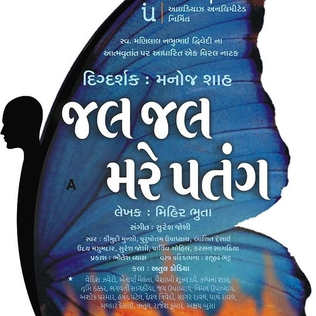
Jal Jal Mare Patang is a 2009 Gujarati language biographical play that was written by Mihir Bhuta and directed by Manoj Shah. The play depicts the life of 19th-century Indian writer and philosopher Manilal Dwivedi (1858–1898).

Mohan No Masalo is a 2015 biographical one-man play about Mahatma Gandhi, starring Pratik Gandhi. Written by Ishan Doshi and directed by Manoj Shah, it depicts the early life of Mohandas Gandhi. First performed in Gujarati, the play later staged in English and Hindi. It was included in the Limca Book of Records for its performances in three languages in a single day.
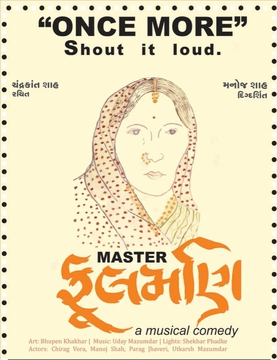
Master Phoolmani is a 1999 Gujarati-language musical comedy play that was written by Chandrakant Shah and directed by Manoj Shah. The play was adapted from Satish Alekar's work Begum Barve (1979), which Chandrakant Shah rewrote from a Gujarati viewpoint to be more relatable to Gujarati audience. The play, which is one of Manoj Shah's best-known works, was first staged on 15 November 1999 at Horniman Circle Gardens, Mumbai. It was influenced by the Bhangavadi theatre style, and depicts the story of two out-of-work theatre actors who enter the fantasy of two aged bachelor clerks.
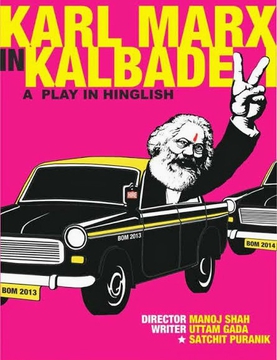
Karl Marx in Kalbadevi is a 2013 one-man play about the German philosopher Karl Marx played by Satchit Puranik. Written by Uttam Gada and directed by Manoj Shah, the play depicts an imaginary visit by Marx to Kalbadevi, the hypercapitalist area of Mumbai, India. The play tried to introduce to a commercially-minded Gujarati community the ideas of a radical critic of capitalist society, in a style that adopts song, dance, repartee, and interactive badinage with the audience to make his complex ideas more suitable to the taste and cultural background of local audiences.

Hu Chandrakant Bakshi is a 2013 biographical one-man play about Gujarati writer Chandrakant Bakshi, starring Pratik Gandhi. The play is written by Shishir Ramavat and directed by Manoj Shah. It was premiered on 15 June 2013 at Prithvi Theatre, Mumbai.
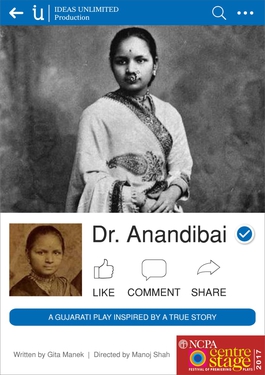
Dr. Anandibai Joshi is a 2017 Gujarati-language one-man play about Anandibai Joshi (1865–1887), first Indian woman physician, written by Gita Manek and directed by Manoj Shah. Mansi Prabhakar Joshi played the role of Anandibai in the production. The play premiered on 2 December 2017 at the National Centre for the Performing Arts, Mumbai for its Center Stage Drama Festival 2017. Unlike Shah's other one-man plays, this play features a woman character for the first time. It was later staged in Hindi and Marathi language.
Mareez is a 2004 biographical play about mid-twentieth century Gujarati poet Mareez, written by Vinit Shukla and directed by Manoj Shah. One of Shah's long-running productions, it premiered on 16 November 2004 at Prithvi Theatre, Mumbai.
Viral Shah is an Indian filmmaker and screenwriter who primarily works in Gujarati cinema. He in known for directing films including Midnights with Menka (2018), Golkeri (2020), Kutch Express (2023), and Gulaam Chor (2023).















